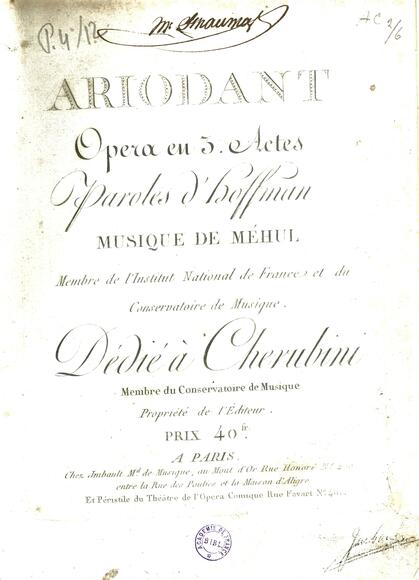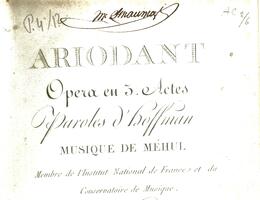Ariodant

Drame mêlé de musique in 3 acts, premiered at the Opéra-Comique (Salle Favart).
Widely regarded as one of Méhul’s best works, Ariodant was premiered on 9 Vendémiaire Year VIII (11 October 1799) at the Salle Favart. The libretto by François-Benoît Hoffman took its subject from Cantos 5 and 6 of Orlando furioso by Arioste, a subject also tackled by Henri-Montan Berton and Jean-Élie Dejaure in Montano et Stéphanie (premiered 15 April 1799). Mounting two operas on the same stage did not damage the respective success of either work. Given 63 performances during the composer’s lifetime, Ariodant’spopularityprefigured the success that Méhul was to have under the Directory with lighter works (La Dansomanie, L’Irato and Une folie). The contemporary press was quick to rank the work as an operatic masterpiece. It also had a lasting influence on composers in Paris. Cherubini, the dedicatee of the score published by Troupenas, praised “this composition, which is full of musical beauty, and of dramatic intentions which are well-chosen and well-crafted”. As for Berlioz, he ranked the work “in the forefront” of Méhul’s output. The sparing, dramatic score is characterised by the use of a recurrent motif that illustrates Othon’s jealousy—it reappears at least fifteen times in the work—as well as by a distinctive treatment of the orchestra which, through the use of unprepared dissonances, conjures up the vehemence of the baritone’s rage. The presence of an expansive aria for female voice—the magnificent “Ô des amants le plus fidèle”—is also an unusual feature in the work of a composer who generally favoured male solos.
Documents and archives

Testimonial, Correspondence

